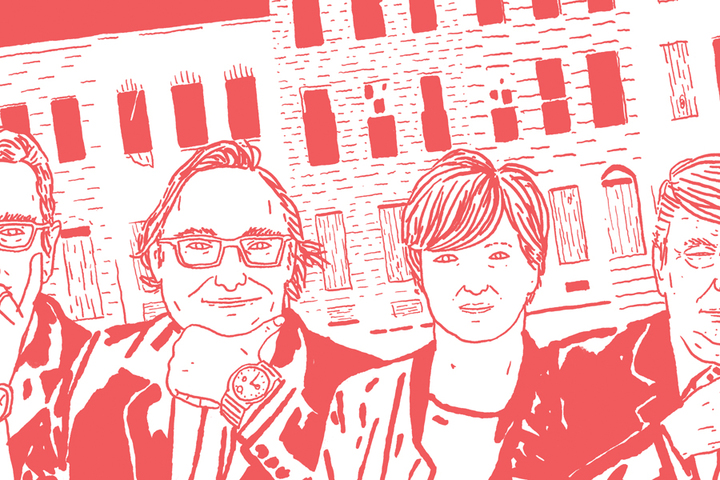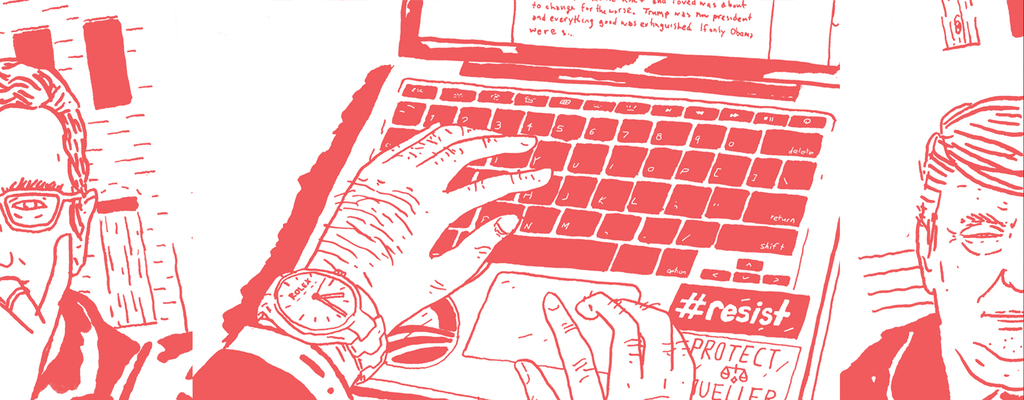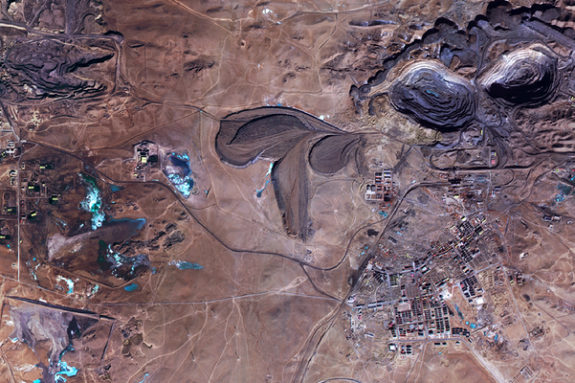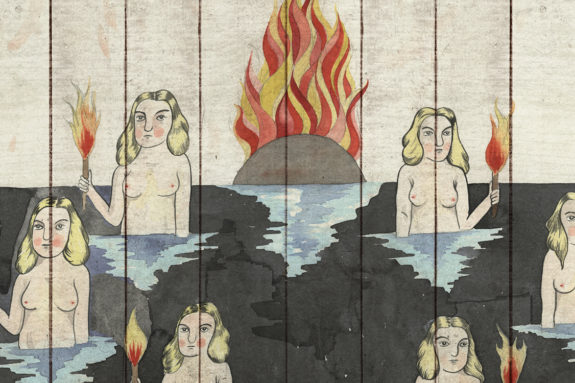Mainstream American novelists know as much about Trump as he does about the American novel.
Lake Success
Gary Shteyngart Random House | $28.00 | 352 pages
Crudo
Olivia Laing W.W. Norton | $21.00 | 160 pages
The Feral Detective
Jonathan Lethem Ecco | $26.99 | 336 pages
Because conservatives don’t make serious art of any kind (this really isn’t an overgeneralization), 2008–2016 was mercifully free of writers of literary fiction trying to produce the quintessential Obama book. There was, of course, Ian McEwan’s baffling boomer animus toward campus political correctness in Nutshell, but otherwise, writers proceeded untroubled by Our Present Moment. We haven’t been so lucky in the two years since Donald Trump’s election: there have been Trump books.
There have been attempted Trump books.
There have been books written by comfortable, professional writers with very little skin in the game, because the Overton window in the publishing industry is narrower than it has perhaps ever been. You won’t find much radical analysis in contemporary fiction: Trump is stupid, rude, a racist and a misogynist; his election was a completely unsuspected usurpation of both a deserving candidate and the norms that bound an imperfect but fundamentally good country together. Now it falls to the few good people left to struggle against him, like Dumbledore’s Army, like District 13, like The Fellowship of the Ring. It must be done, and it must be done now, but it must be done in a kind, hopeful, affirming way, or we will be no better than he is.
There are of course logistical difficulties involved with “writing the present.” Books take a long time to write, they take as long to publish; for first-time authors, there is the process of securing an agent and that agent securing an acquiring editor interested in the book and the acquiring editor pitching the book to their publisher, followed by printing and marketing. Self-publishing excepted, you’re looking at a turn-around of two to three years minimum. So, it is only now that the first wave of Trump-era books have begun to appear, and they are not good.
“That the world may demand a more radical response than self-care and that a world where Trumps are no longer possible may also have no place for upper-middle-class fauxhemians isn’t considered.”
Trump is evoked enough in Gary Shteyngart’s Lake Success that he ought to feel integral to the book, and yet nothing of substance is ever said about him. In plot terms, the novel’s lead character, Barry Cohen, a hedge fund manager in his forties with a beautiful wife many years his junior, sets off on a cross-country road trip with his collection of vintage watches after a bout of violence directed towards his severely autistic infant son. Running the risk of making his lead character too likeable, Shteyngart makes Cohen a Republican—not a Republican like Trump you understand, more a Reaganite, or part of the intellectual legacy of William F. Buckley, shocked to find racism in the Party of Lincoln.
Road trips to see the Real America are usually a profoundly lazy plot contrivance on par with having a character explain their problems to a psychoanalyst, and Cohen’s in particular has the quality of a guided tour rather than anything organic or character-driven: on the left you’ll see Black America during a particularly loathsome interlude in Baltimore that involves The Wire, on the right you’ll see benighted, MAGA-chud America when he stops at a bar. Of note is the brief time he spends with an ex-girlfriend, now a college professor. She is teaching a class on the Holocaust, which naturally is about Trump—remember when Trump/Hitler comparisons were fashionable, before we realized that he was a fascist only insofar as his Alzheimer’s precludes him from grasping anything more complex? The professor has been on the receiving end of online abuse from a member of the Alt-Right (remember when we were always talking about them?), and incorporates this into the class:
“Who knows who this is?” Layla asked, pointing at the frog.
( . . . )
“It’s Pepe the Frog,” one of several Mexican emo girls in the class explained. “He’s a white supremacist symbol.”
“And what does ‘MAGA’ stand for?” Layla asked.
“Make America Great Again.”
Rote memorization of a professor’s Twitter mentions as pedagogical method aside, the passage is telling for its focus on symbols—on language, essentially—and those who would wield them as the primary problem rather than the political and economic forces that produce young men who want to send Jewish college professors pictures of mutilated bodies. That the Alt-Right is more or less nonexistent after Charlottesville or that his knowledge of it seems to begin and end at Hillary Clinton’s “Deplorables” speech isn’t as much an issue as a lauded writer skimming the surface of an issue in a medium that should allow him to dive in deep.
It’s the book you’d write if you had a $1.1 million dollar apartment in Gramercy Park and were given to saying things like, “In 2016, I needed to take my mind off the election ( . . . ) and I find that the way the second hand glides across the dial on a non-quartz watch calms me down.” It’s a book about manners, not structures; classiness, not class. Trump is spoken of as a monster, not the fulfillment of decades, centuries perhaps, of deliberate acts by Republicans, Democrats, big business and the very real, quite boring deep state. The problem for Cohen is that something he values, America or the dream thereof, is being revealed to be worth far less than he assumed—as if he had one of his five-figure watches appraised and found out that it was a fake. His reaction is not to reassess the value of watch collecting (briefly, there is none), but to find some interloper to blame. Trump is a perfect nemesis; like him in so many ways but quintessentially not, a funhouse mirror version of a wealthy Manhattanite.
While Lake Success is an aesthetic mistake, Olivia Laing’s book Crudo feels near criminal in its disregard for real suffering. Its protagonist, a still-alive and yet thoroughly gentrified, deradicalized version of the great avant-punk novelist Kathy Acker, worries about nuclear annihilation and the erosion of norms as she prepares for a lavish wedding in Tuscany (she and her poet husband have “accidentally gone on holiday with the super-rich”—accidents will happen). She is not worried about being deported to Honduras, having her mosque burnt to the ground, her synagogue riddled with bullets, or the cop who shot her child being given a month of desk duty. She isn’t worried about these things happening to people she knows—the people she knows are real-life London literary types referred to only by their first names. Even national borders are no concern to her as she slides effortlessly from Italy to New York to London. No, book-Kathy is worried that reading about these things will make her sad. She misses Obama.
Like so many of her ilk, wandering bereft of even the most rudimentary class analysis, her first thought is to reduce Trump’s appeal to a symptom of an individual moral failing shared, somehow, by hundreds of millions of people: “How had all this happened? Some sort of gross appetite for action, like the Red Wedding episode only actual and huge.” At least she doesn’t refer to Harry Potter, but even when you’re done cringing it remains a confusing passage. Did a gross appetite for action cause the Red Wedding episode to be written? Is a gross appetite for action what has caused the Red Wedding episode to have entered the cultural lexicon? Like George RR Martin, Laing has a tendency to write lovingly about food, and the inclusion of the word “appetite” in the passage is part of a larger schema. Ersatz Kathy Acker deserved an endless brunch, because don’t people like her deserve to be happy all of the time? But now some crass, nouveau-riche lech has gone and ruined everything (Trump’s closest Game of Thrones analogue being not the powerful and malevolent Night’s King, but the decaying, failson-generating Walder Frey.)

Should there be a future, historians of our time will use Crudo to teach baffled students how neoliberalism reduced everything to the status of products and our interaction with the world to the question “Does this product make me feel good?” Like Barry Cohen, ersatz Kathy Acker believed that she was owed unlimited contentment and, now that she has been short-changed, she experiences a middle-aged white woman’s worst nightmare: she can’t even speak to the manager. That the world may demand a more radical response than self-care and that a world where Trumps are no longer possible may also have no place for upper-middle-class fauxhemians isn’t considered.
Jonathan Lethem’s The Feral Detective is the latest in a decade-long attempt to break out of a slump that began with 2007’s You Don’t Love Me Yet (or if I’m being less charitable, 2003’s Fortress of Solitude). The book is billed as a return to the detective genre that served him so well in Motherless Brooklyn: in it, a middle-aged woman travels from New York to the deserts outside Los Angeles to search for a friend’s missing daughter, which brings her into contact with the titular Feral Detective. Lethem’s Charles Heist is an incredibly weak version of Thomas Pynchon’s “Doc” Sportello, and The Feral Detective a catastrophically worse version of what was already perhaps the worst Pynchon book, Inherent Vice.
If that was all it was, then The Feral Detective would have been just another entry in the Jonathan-Lethem-trying-to-get-his-groove-back saga, alongside Dissident Gardens and The Gambler’s Anatomy. He claims to have begun to plan the book before the election, but on the morning of November 9 “felt undone . . . That included any prospect of writing anything that’d matter.” Undeterred, he ploughed ahead, writing the novel he would have written anyway but with Trump mentioned on average once every twenty pages.
Like Laing, he uses popular culture to refer obliquely to Trump, and like Laing he both misses the mark and tells on himself in the process. Twice in the book Trump Tower is referred to as the Tower of Sauron, making Trump himself Sauron. The comparison of a man who may be unable to walk upstairs with an omnipresent force of ancient evil is ludicrous, sure, but it’s revealing: Trump is barely a human being in Lethem’s world, more a symptom of a planet fundamentally out of balance, a “life that had curdled in its premises” as he says elsewhere. Writing Trump as a darkness fallen upon the land has a little more literary merit than calling him Cheeto Mussolini, but it still reveals an impoverished worldview in which things simply happen because people forget that they ought to be good, and in which we can do nothing but make space for self-care and the occasional act of interpersonal kindness.
The above are hardly the only Trump books, and there are more coming. John Lancaster’s The Wall muddles together Trump’s defining policy with Brexit, climate disaster and, naturally, Game of Thrones; Mark Doten’s Trump Sky Alpha pictures the President piloting the eponymous “super luxury airship” before his live-streaming causes a nuclear conflagration. Perhaps these books, or others, will get it right, but I doubt it. I find it more plausible that nobody from the dead center of the political spectrum can get it right so long as they employ Trump as window dressing for stories of the same neurotic but ultimately good-hearted middle-to-upper-class coastal liberals that a good portion of literary fiction has always been about. They won’t get it right as long as everything is reduced to the personal, to atomized individuals feeling just awful that bad things are happening somewhere else to someone else— seeing the world in terms of the actions of individuals, not systems, and definitely not in terms of class struggle. They definitely won’t get it right while one of their key criticisms of the current regime is that America no longer sounds the way that good guys sound in prestige television and children’s books. They won’t get it right as long as they’re not asking difficult questions about why authoritarianism is on the rise, and how their own class might be complicit with it. That will be the real challenge, because it goes against everything that literary fiction and the capitalism that engendered it have told writers, readers, and publishers about what is valuable, in the novel and in life itself.





